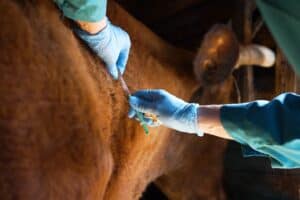The resurgence of measles is partly because routine vaccinations were missed during Covid-19. It should've been a self-correcting problem.

Déjà vu, much? The World Health Organisation (WHO), the US Centres for Disease Control (CDC), and the Irish government all separately in the past week warned against a resurgence of measles in their respective bailiwicks.
All three of these venerable institutions lamented the decline in the number of parents immunising their children.
ALSO READ: Health Department confirms German measles outbreak in Northern Cape
None of them identified one of the major culprits in the growth in vaccination scepticism– themselves.
They have lost through their actions during the 2020 Covid pandemic much of the previously unquestioning scientific and moral authority they once enjoyed.
That has helped what were once fringe moments gain influence.
Remember Covid? Although the disease is still around, the “Covid dashboards” on every news site, daily updating the statistics, are long gone.
And while there are still regular recommendations from the WHO, national health agencies and pharmaceutical companies urging the public to report for another round of vaccinations, these go unreported and unheeded.
The public amnesia is quite remarkable, especially given the devastation that the pandemic caused.
First, there are the quantifiable costs. Between seven million and 28 million died from (or with) Covid. It also caused the biggest economic crisis since the Great Depression.
Then there are the social costs which are incalculable but substantial. The intricate web of daily life was transformed in an instant into a world of loneliness, isolation and fear.
ALSO READ: New cancer cases to soar 77% by 2050 – WHO
The disruption of schooling and the tragic effects of deferred treatments for other life-threatening medical conditions are still being felt.
And here’s another important effect that the political establishment refuses even to acknowledge exists, never mind deal with.
It’s how the management of the pandemic by the WHO, national governments and the mainstream media has seriously damaged the public’s trust in these keystone institutions.
In most developed countries, but especially in Europe and the United States, routine immunisation against preventable childhood diseases is in decline.
In part, this disease resurgence is because routine vaccinations were often missed during the pandemic. But that’s a self-correcting problem; after lockdowns were lifted, normal vaccination uptake patterns were expected to resume.
That’s not happened. Instead, there has been a marked rise in vaccination scepticism, which has morphed into a more general distrust of health authorities and scientists in general.
And we’re not here talking about conspiracy nutters. Most of the citizenry comprehends that during a global crisis, which the pandemic was, trade-offs had to be made between swift interventions and unintended, potentially harmful, consequences.
Especially when these decisions had to be made based on sketchy information. What they don’t appreciate is the high-handedness and dishonesty.
ALSO READ: ‘Fight gender-based violence like Covid’
WHO, dutifully parroted by national health authorities everywhere in the democratic world – with the admirable exception of Sweden – proclaimed certainties about matters that, at best, were scientifically murky and of dubious value.
It’s not that there were no credible counterarguments to consider. Despite claiming to “follow the science” in pursuit of evidence-based decision-making, as the authorities claimed to be doing, they ruthlessly closed down dissenting voices, no matter how mainstream.
To this day, neither the global medical nor media establishments are willing to acknowledge that they were often wrong.
In a similar vein in South Africa, we have yet to see those who were arguing for legislated mandatory vaccinations concede that they got it wrong.
The medical and media establishments acquitted themselves poorly during the Covid pandemic. Worst of all, they appear to have learned nothing from it.
Support Local Journalism
Add The Citizen as a Preferred Source on Google and follow us on Google News to see more of our trusted reporting in Google News and Top Stories.






